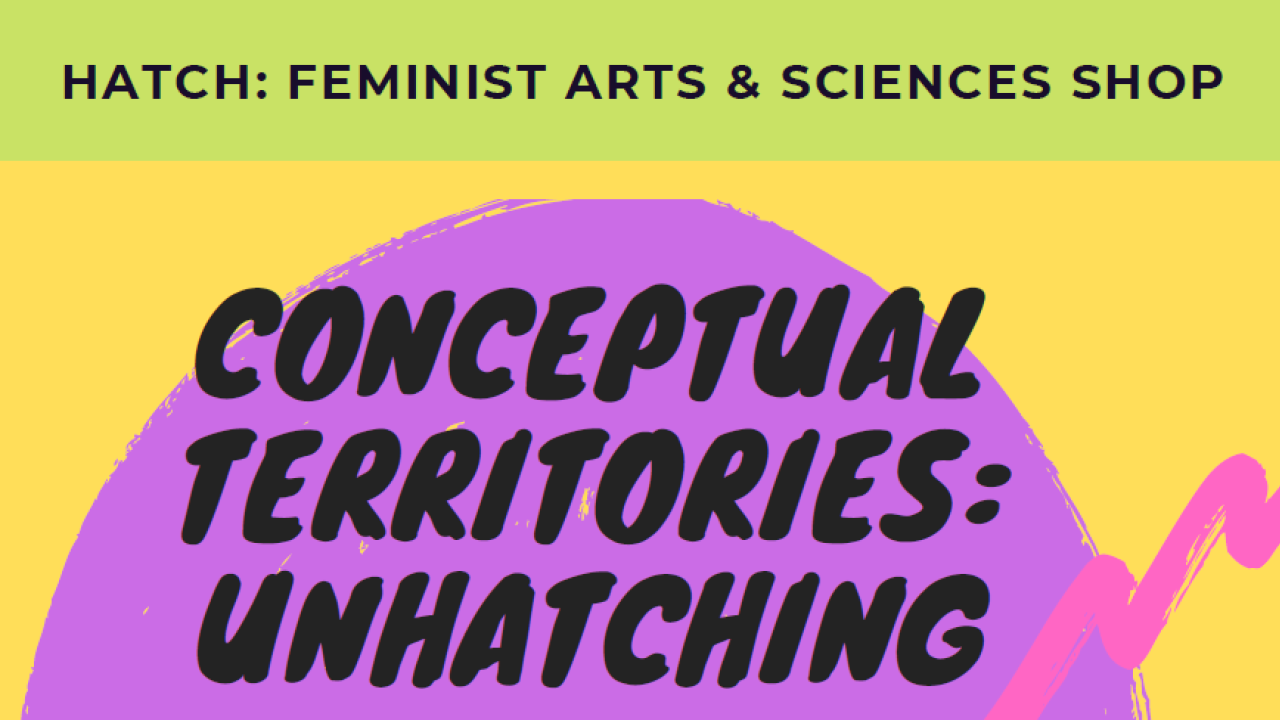
This Spring, HATCH Unhatches with Reading Group and Speaker Series
Since 2017, HATCH, the Mellon Research Initiative in Feminist Arts & Sciences, has brought together a wide range of science makers and knowledge producers, including UC Davis faculty, graduate and undergraduate students, artists, and community activists, to develop new approaches to feminist pedagogy that challenge disciplinary boundaries. The initiative’s website explains that its name, HATCH, is intended to be “a generative, open one (think: hatch an egg or a plan or slip down an escape hatch).” By fostering lab-based and other experimental spaces, HATCH creates a more democratic and community-driven model of feminist science making. This model rethinks traditional academic and scientific categories of knowledge that have often excluded certain types of science makers and scientific practices. A past 2018 workshop, “Toward Feminist and Queer Technologies: Critical Workshops for Unpacking Expertise and Skill-sharing Tactics” drew inspiration from electronic waste workshops and deconstructed the skill of soldering common in hacker and skill-share cultures to unpack questions about what kinds of skills are shared, how they are shared, and who gets to share them.
HATCH’s previous theme, “HATCHING Worlds,” experimented with feminist science that envisioned new worlds and ways of being. This experimentation included a “Health Activism Performance Lab,” hosted by Caro Novella, a performing artist-researcher and UC Davis Ph.D. candidate in Performance Studies. This participatory lab invited artists, students, and activists to engage with the politics of community health science through community performance and art-making. The lab incorporated embodied studio practices, performance scores, and open floor discussions as new ways of thinking about health and politics together.
HATCH builds off this previous theme and returns this spring with one that considers what kinds of unmaking and undoing are necessary to make new worlds. “Conceptual Territories: Unhatching” aims to create spaces that “unhatch” terminologies and domains of knowledge that position feminist science-making practices, Indigenous ecological knowledges, and other “non-expert” practices as outside the realm of science itself. HATCH’s spring programming experiments with ways to unmake regimes of scientific expertise and capitalist notions of productivity that draw boundaries around expert and non-expert knowledge, productive and non-productive work, and that profoundly shape what practices get funded and what counts as science.
HATCH kicked off their spring programming this week with a nationwide reading group on Katherine McKittrick’s Dear Science and Other Stories, a book that exhibits a wide range of Black and anticolonial methods to show how the imaginative and collaborative power of Black storytelling can disrupt the scientific systems of knowledge that monitor and index blackness and Black life. McKittrick shows that black intellectuals and artists can offer new ways of living outside these systems. Later next month, on May 20th at 4:00 PM, HATCH will be hosting McKittrick as a speaker to discuss her book. "Black Methodologies and..." will feature McKittrick and discussant Jasmine Wade, a PhD student in Cultural Studies. Register here via Zoom.
The reading group will then meet again on May 10th at 12:00 PM to read MEAT!: A Transnational Analysis, a collection of essays edited by Sushmita Chatterjee and Banu Subramaniam. Following HATCH’s spring focus on unhatching scientific terminologies that shape our understanding of the world, the book’s contributors chart the many shifting meanings and definitions that meat has acquired across time, region, and culture. MEAT! explores how meat has become inseparable from the politics of race, empire, gender, and disability. As with Dear Science, the reading group will be followed by a speaker event on May 19th at 12:00 PM when a roundtable of MEAT! contributors will discuss the collection.
In addition to its programming, HATCH will also be announcing funding opportunities this spring for graduate student projects. You can find more information about HATCH and their programming on their flyer and at http://hatch.ucdavis.edu/.
